Peter MALONE
Locked in
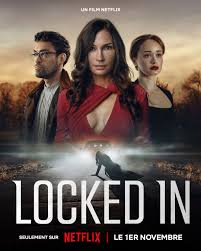
LOCKED IN
UK, 2023, 96 minutes, Colour.
Famke Janssen, Rose Williams, Alex Hassell, Finn Cole, Anna Friel.
Directed by Nour Wazzi.
This is something of a pastime movie, some audiences enjoying it is a psychological thriller, others very critical and dismissing it.
The screenplay is by Rowan Joffe (Brighton Rock).
This is a British production, a mansion, a sinister witch=like figure, an orphan seeming-heroine, a doctor. The title refers to a patient in hospital, Katherine, played by Famke Janssen, the matriarch of the mansion, coming out of coma, unable to communicate except by blinking, eventually indicating to the sympathetic nurse, Anna Friel, that she is the victim of a murder attempt. Visiting the hospital is Lena, Rose Williams, adopted daughter of Katherine.
Lena tells her story to the nurse, not always the truth. The action of the film moves back to Lena’s childhood in the situation at the mansion, Katherine and her stepson, always ill, and owning the mansion on the death of his father. The action also moves back three years to the wedding between the two young people and the further complications. Also in the action is the local GP, Dr Lawrence, who supervises the medication for the young epileptic.
As the plot develops, it seems moving towards a straightforward solution to the murder attempt – but, then there are so many twists, changing emotions, seeming betrayals, that it is difficult to know the authentic feelings of each of the three central characters. Some audiences enjoy trying to work this out – others gave up on it.
- The title, Katherine and her injuries, coma, physical and psychological condition? Main characters locked in the mansion? Jamie locked into his epileptic condition, staying in the mansion?
- The British thriller, psychological? Touch of the Gothic? Memories of Rebecca?
- The mansion, the grounds, the interiors, the river and the island, the hospital? The musical score
- The opening, Nurse Nicky, focus on her face and eyes, her interrogating Katherine, getting her to identify letters? Katherine, recovering from coma, her injuries, eye shut, fixed eye, linking? Returning to this sequence at the end?
- The screenplay, the present, going back 30 years, going back three years, the dramatic interplay of the time eras?
- Lena, at the hospital, with Nicky, concerns, fears, narrating the story?
- 13 years earlier, the situation, Katherine and Lena’s mother, friends, falling out, the mother’s death, Katherine becoming surrogate mother, her husband and his death, stepmother to Jamie? The past career, wanting a comeback, dressing up and going out, socialising?
- The issue of the inheritance, Jamie owning the house, Katherine in charge but not in charge, Lena and her age, devotion to Katherine, devotion to Jamie? His health, epileptic fits? And his ability to pretend to have fits?
- The flashback to 3 years earlier, the surprise of Jamie and Lena marrying, Katherine hovering like the traditional wicked witch, her speeches about the house, toasting, Jamie’s reaction, the dancing, his having a fit, carried out?
- The presence of Dr Lawrence, the prescriptions for Jamie, the discussions about the prescriptions? At the wedding? Jamie in the hospital, the encounter with Nurse Nicky and her criticisms, his reaction?
- Lena, the isolation, her journal, her thought about Katherine, the birthday sequence, the cake, Katherine’s reaction? Dr Lawrence’s presence? Lena and the attraction, her seduction, the sexual encounters? Indication of being willing to murder, Jamie and his wanting to have a picnic on the island, Dr Lawrence and his plan, going past the woodcutters, capsising the boat, dragging Jamie down? The police and satisfactory explanations?
- Lena and visits to the hospital, Katherine’s gradual recovery, the indication of murder?
- The seeming straightforwardness of the plot, the murder of Jamie, the murder of Katherine, the selling of the house, the money? Yet Lena and her protectiveness towards Jamie, the impact of his death, in the fascination with Dr Lawrence the future, her reactions to Katherine?
- The even further twists, audiences puzzled about Dr Lawrence, with Katherine, the seeming plan, with Lena, seeming double betrayals, the pursuit of Lena, Katherine saving her, not shooting, Dr Lawrence driving and hitting Katherine? The plan to take Katherine from the hospital, bring her home, the suggestion of poison?
- The setup, Katherine and her blinking, communicating with Lena, Dr Lawrence preparing the medication, Lena and decisions, injecting Dr Lawrence, stabbing Dr Lawrence, Nurse Nicky and her concern, the arrival of the police?
- The future, Lena owning the house because of Jamie’s death, with Katherine…?
Remembering Gene Wilder
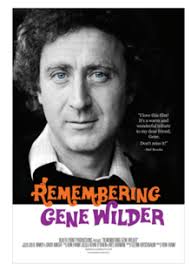
REMEMBERING GENE WILDER
US, 2023, 92 minutes, Colour.
Directed by Ron Frank.
This is a very enjoyable documentary, especially for film buffs and, most especially, those who like and admire Gene Wilder.
Gene Wilder died in 2016. Fortunately, for his admirers, he wrote a memoir, published in 2005 Kiss Me like a Stranger with Wilder himself reading it for an audiobook. Which means then there are Wilder’s own words and commentary as background to the documentary, about his early life, his early career, his move into movies, his comedy, writing and then directing, details of his successful movie career, and then his later years. And, readily available, quite a range of interviews over the decades. And, of course, there are his films and his television appearances in Will and Grace.
One of the main impressions from this documentary is that Gene Wilder was a very nice person, genial, friendly, rather more quiet – as indicated by his tone and responses in his audiobook as well has in television interviews. There is a reference to his raising his voice in a dispute with Mel Brooks but then Brooks explaining that he was provoking Wilder to ensure that Wilder really believed in the suggestions he was making for the song, Puttin’ on the Ritz in Young Frankenstein.
Gene Wilder’s name was to Jerome Silberman, from Milwaukee, Jewish family, not devoutly practising but with the traditions. But, for his career, he wanted to do something – Wilder! The documentary offers information about Wilder himself, his family, his friendly cousin, schooling.
He began his career on stage, was a production of Mother Coverage with Anne Bancroft. It was Anne Bancroft who made the suggestion that Wilder would be suitable for the key character in her husband, Mel Brooks, planning to film Springtime for Hitler, released as The Producers.
One of the advantages of the documentary is that a good amount of time (though always room for more) given to the production of different films and of Wilder’s performance, especially those with Mel Brooks: The Producers, Blazing Saddles (he was not the first choice, coming in for an alcoholic Gig Young but making the character his own), and Wilder’s own screenplay, Young Frankenstein, fortunately taken up by Fox after Columbia executives rejected the film because it was to be in black-and-white in homage to James Whale’s 1930s films. There is quite a focus on at the Frisco Kid, the Jewish background, his working with Harrison Ford. And, there is his collaboration with Richard Pryor, combining well on screen, but not close in real life, with helpful commentary by Richard Pryor’s daughter: Silver Streak, Stir Crazy, See No Evil, Hear No Evil. And, there is Wilder’s writing and directing for Sherlock Holmes Younger Brother, The World’s Greatest Lover, and interviews with star Carol Kane.
One of the delights of the film is continued interviews with Mel Brooks, in his 90s, still genial and comic and full of praise for Wilder.
The documentary also focuses on his encounter with Gilda Radner, working with her, the clicking, partnership, their marriage, her cancer diagnosis, her strong character, the effect on Wilder, her death.
In his later life, the genial Wilder gave interviews to television hosts but retired to writing, five books, to watercolour painting. He also married the psychologist that he consulted for advice on one of the films but Karen Boyer, married to her for 25 years (there are no references to his earlier marriages and divorces).
The sad part of the documentary is Wilder’s gradual losing his memory, the touches of dementia, and footage of these later years.
This film has won several awards, audience awards, especially at it Jewish festivals. But, audiences with memories of favourite scenes from gene Wilder films, a documentary treat.
Reckoning, The/ UK 2023
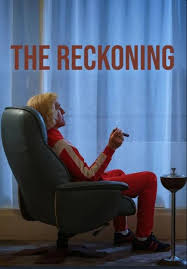
THE RECKONING
UK, 2023, 4 X 60 minutes, Colour.
Steve Coogan, Mark Stanley, Robert Emms, Gemma Jones, Neal Pearson, Siobhan Finneran, Mark Lewis Jones, Fenella Woolgar.
Directed by David Blair, Sandra Goldbacher.
The Reckoning is a strong television series, very difficult to watch. It is the story of the career of television personality, Jimmy Savile, and the revelation, a reckoning, of his abusive life.
The screenplay has been cowritten by Dan Davies, who had seen a television program of Jimmy Savile when he was young, followed through with his interest in Savile and seeming inconsistencies in his persona, eventually many interviews with Savile himself, finally writing an award winning account of several and his crimes.
From Wikipedia: “The boxes containing the many tapes, interview transcripts, newspaper cuttings and research articles that went into my book are taped shut and piled high in a shed. I don't want them in the house in which my three children live.
Davies' book In Plain Sight: The Life and Lies of Jimmy Savile was published in 2014. The book formed part of the basis of the BBC television series The Reckoning, and the series includes many scenes where Davies, played by Mark Stanley, interviews Savile.”
The sequences of interviews with Davies are a framework for the exploration of Savile’s life – and they are uncomfortable watching, Savile sociable, insinuating about his life yet in denial, needing to talk to Davies, the clashing, his calling him back.
With the flashbacks, there is information about Savile and his family, his referring to his mother as the Duchess (played by Gemma Jones), visiting her in Scarborough, grieved at her death, yet revering her as something of a saint. Then there are his early years in television, his eccentric manner, his way of talking, the friendly persona, on the BBC, Top of the Pops – and later his program as he travelled in his caravan interviewing people around the UK and his manoeuvring himself into the television program, Jimmy’ll Fix It.
It was courageous of Steve Coogan to take on the role but he has shown quite versatility in television programs and personas as Well Is in films. He is made up to look like Savile, perform like Savile. And the filmmakers have decided to include quite a range of sequences with the actual Jimmy Savile making Coogan’s performance all the more eerie.
The series is in four parts. By the second part, teenage enthusiasts are introduced, focusing on one girl in particular who is assaulted and commits suicide. While Savile is called before the authorities, he always has an answer and, despite rumours, succeeded in his covering his crimes until he died.
Each episode is framed by testimonies from actual survivors of Savile’s crimes. And, some of their stories are re-enacted, when they were children or young adults, making Samples double life, especially his travelling caravan, all the more sinister, accosting, especially young girls, and assaulting them with dire results.
But, unmarried, capitalising on his freedoms, over the decades he raised millions of pounds for hospitals, acclaimed by Margaret Thatcher who eventually gave him a knighthood (actress Fenella Woolgar doing an excellent impression of Margaret Thatcher), crazed affirmed by Diane, meeting with the Pope, John Paul II during his tour of Britain, a papal knighthood.
However, there were some who are suspicious, especially at the end, the series showing him hanging around hospitals, lurking in the morgue suspiciously, confronting nursing staff who push in the side.
With the revelations after his death, great disillusionment with the British public, to have feted him and believed him for Savile’s many decades, the discovery that he was an abuser, a predator, narcissistic, all show in stating he would put smiles on people’s faces, but interiorly, a loner, lonely, angry…
The series should be seen in conjunction with the BBC documentary, Jimmy Savile: A British Horror Story (2022).
Trigger Warning
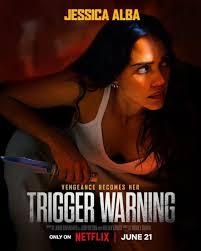
TRIGGER WARNING
US, 2024, 106 minutes, Colour.
Jessica Alba, Mark Webber, Anthony Michael Hall, Tone Bill, Jake Weary, Gabriel Basso.
Directed by Mouly Surya.
This is quite a standard action film, interestingly directed by Indonesian director, Mouly Surya (Murder in Four Acts).
It opens outside the United States, a terrorist episode, introducing Jessica Alba is a tough agent, enabling her to be the lead in an action film. She returns home at the death of her father, killed in a mine collapse. They are Hispanic family, looked down on by some of the local inhabitants.
In her investigations, she has to confront the local Senator, Anthony Michael Hall,. One son is the local sheriff (Mark Webber) the other is a thug, involved in stealing weapons from an Army Depot with a gang.
A lot of expected investigations, clashes, fights, revolution of the truth, the final confrontation in the minds and tunnels.
Familiar material, the variation for a star turn by Jessica Alba.
- Popular action thriller? Overseas action? Action in a small American town?
- The opening, CIA, surveillance, terrorists, the attack? Parker, talent in action, her partner killed? Working with Spider? Her return home?
- The town of Creation, small, the sheriff’s office, risen, the Sen’s mansion, the mine, the interiors, the arms depot, the tunnels? The musical score?
- Parker, her relationship with her father, the flashbacks, Hispanic and local reactions, the Hispanic community, her father, the mine, the collapse? Her investigation, discussions with the sheriff, an accident? Finding grenades? Her suspicions?
- Trapping Mike, feeding the lizard, their friendship? His mother, the continued help?
- Jesse, sheriff, the past relationship with Parker, some of the senator? The senator, the billboards, his conservative approach? Elvis, personality, his thug friends, the revolution of the stealing of the arms, selling them? The contact, Ghost? The deals, the threats, the deadlines?
- Parker, confrontations with Elvis, his gang? The fights, her skills? Discussions with the senator, the meal, Spider giving a warning, leaving, the confrontation?
- The buildup to a climax, Spider and his arrival, the gang, attacked? Parker, the arms, the old man giving her the machete, getting the cooperation of Mike and his mother, Hispanic friends?
- The climax, the confrontations in the mine, the fights, the final fight with Elvis? The explosion, Spider and his being overwhelmed, rescued? Parker and the confrontation with the senator, with Jesse?
- Jesse, ambiguous, the relationship with Parker, the sexual encounter, the aftermath, the revelation of his participation in the scheme? The finale, Parker chasing him in the depot, the final tour, his killing himself, the explosion?
- The aftermath, renaming the County, new candidates, Parker with Spider at the service station, Mike and the phone call, the bar and its future?
Bricklayer, The
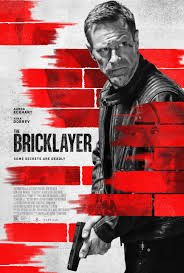
THE BRICKLAYER
US, 2023, 110 minutes, Colour.
Aaron Eckhart, Nina Dobrev, Clifton Collins Jr, Tim Blake Nelson, Oliver Trevino, Ilfenesh Hadera.
Directed by Renny Harlin.
This action thriller is based on the novel by former Marine and FBI agent for 20 years, Paul Lindsay, writing under the name of Noah Boyd. The screenplay has changed the agency from the FBI to the CIA.
Renny Harlin has made action thrillers for several decades, especially Die Hard 2. There is quite a mixed quality to his work. The action sequences are very strong – even though Aaron Eckhart is the hero, bricklayer, agent, is able to defeat all kinds of tough opponents, though in one sequence succumbing to just one of them! However, Eckhart is strong and tough in the role.
The villain is seen at the opening, Clifton Collins Jr, a disaffected agent, turning Road, wanting to expose the CIA and its many tentacles in Western cultures, secret assassinations…
The central character is a very prim, first, agent played by Nina Dobrev who accompanies the bricklayer to Greece where the action takes place. Quite a number of complications, assassination of journals, a political assassination attempt, a final confrontation between hero and villain despite a bonding in the past.
Tim Blake Nelson is the CIA boss.
More or less as expected.
- The title? The cover for the CIA agent? His explanation of his liking the work, precision, well fitting?
- The CIA, action throughout the world? Attitudes Western countries? Covert operations? Assassinations and targeting? Reactions?
- The realism of the screenplay? Or far-fetched?
- The opening, the journalist, Victor Radek, his purpose, her reporting, the photos and or sitter? Shooting her? The next journalist on the list? The group politician on the list? His making a case, disrepute of the CIA?
- The introduction to Steve Vail, Philadelphia, working on the building, the bricks, precision? Contact O’Malley? The meeting with Kate? The explanation of the situation? His decision to go to Greece, with Kate?
- The subtext of Miles Davis, music, records, the gift from Victor Radek, Tye with the collection of records, indication of her guilt?
- Kate, her CIA work, the office, re-examining the photos, discovering Radek?
- The flight, the interactions between the two, her self-importance, professional, his attitudes, Frieda? The arrival, posing as husband and wife, the hotel, the range of surveilance? Going to meet Patricio, his skills, the vehicle, IT and tech?
- She’s three, to the social, meeting with Tye, the past relationship, the discussions, her being bureau chief? The later encounters with her, at the apartment, the music?
- The attack on the journalist and the square, the protesters, Constantine and his speeches, Radek and his communication with Vail, motivations, memories, the death of his family? The decoy and Vail following, the shooting? The escape, the pursuit, talking with Radek?
- Vail and his visiting the club, the thug and his respectability, the fights? The credibility of Vail and his ability to conquer so many attackers? Yet in the office, his being overcome? The dangers for Kate, her involvement, with the vehicles? And the use of tracking devices?
- Vail, the memories and flashbacks with Radek, his family, his job is with the CIA, the promised to transfer his family, the Russians, the killing his family? Vail, the deal with Radek that he could disappear?
- The car chase, Radek’s escape, with the camera on the building, male or knocking it, the assassination attempt failing? Konstantin and his change of attitude, rescued by the CIA?
- Final confrontations, Radek’s death, the suspicions about O’Malley, the vast transfer of the bid calling? Vail and his suspicions, going to Tye, the confrontation, her death?
- The end, the interview with Kate and O’Malley, his being upset about suspicions, offer of promotion to Kate, her refusal? And Vail going back to his bricklaying?
In the Room Where He Waits
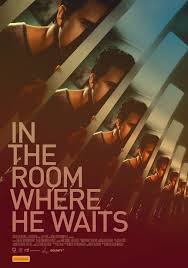
IN THE ROOM WHERE HE WAITS
Australia, 2024, 88 minutes, Colour.
Daniel Monks, Susie Porter, Annabel Marshall-Roth, Anthony Brendan Wong, Chris Bartholomew.
Directed by Timothy Despina Marshall.
An evocative title, the audience immediately wondering who “he” is. And why he is waiting in a room. An invitation to join him?
This is a small-budget film, filmed during the Covid years in Brisbane, the action can find, in fact, to 2 rooms and a hotel corridor, more than a touch of the eerie, listen to the corridor in The Shining. There are windows, glimpses of the city, few pedestrians, few cars, a train passing by. However, there is no explicit reference to Covid, simply the situation for the central character, Tobin, in lockdown, locked in and locked into his character, a kind of prison experience, locked up.
Tobin is an actor, returning from the US, separated from his partner, contact with his mother, participating in his hotel room by his with rehearsals for Tennessee Williams The Glass Menagerie, text from one of his fellow-actors. That is the setting of the scene.
However, what is important is the atmosphere, Tobin in lockdown, confined, the mental pressures, mysterious objects appearing, underwear, red shirt, cufflinks, and disappearing, contact with the the hotel receptionist by phone, a guard patrolling the corridor and keeping him in. Noises in the night, since it strange presences. He does ask to be transferred to another room – eventually moving more strange experiences, an old naked man seen sitting in the chair… What is happening to him?
That is the general focus of the screenplay. However, there are most important subtexts which make this film quite different from others.
Firstly, the actor portraying Tobin, Daniel Monks, is a disabled actor, a campaigner for the disabled actors, and his character, Tobin, with tensions in his arm and leg, able to use them freely, limping.
Secondly, there is a gay subtext, with Daniel monks and with the director, and the significance of portraying gay characters, Tobin, his mother liking his partner from whom he is now separated, his emotional needs, physical needs, psychological needs, dating apps…
Thirdly, there is a subtext of Tennessee Williams The Class Menagerie, and the parallels between Tobin’s mother and the mother in the play, the character of the son, Tom, and the character of the Gentleman Caller and Tobin seeking a caller.
The film is well-made, keeps the attention, and the tension, involving the audience keeping them waiting with Tobin in the room.
- The title and its atmosphere? The focus on the room, the question of who is “he”? Why he is waiting? Inviting the audience to meet the “he” and join in the waiting?
- The production filmed during Covid lockdown, Brisbane, vistas outside the window, city, the train passing, few people, few cars? In two rooms and the corridor – and the hotel corridor reminiscent of The Shining? Touches of the sinister?
- The performance by Daniel Monks, Tobin in the US and returning, the goodbye to his partner, cutting contact with his partner? The rehearsals for The Glass Menagerie, his role as Tom? The sequences of rehearsal on Zoom? Phone calls with his mother, relationship, love, tensions, her taking superior attitudes, his being upset with her? Memories of his father, alcohol, his mother’s attitude? Saying that he would be like his father? The contact with Sienna, her texts, the discussions with the producers of the play? His being late, unreliable, his being fired?
- The experience of lockdown, confined to the hotel room, the view from the window, meals at his store, glimpses of the guard, contact with reception? The isolation and its effect?
- The eerie happenings and their effect on Tobin, the card jumping out of its hold, the lights going out, the cufflinks at the door, the red shirt, briefs, his putting them outside, the phone calls from reception about them, the reappearing, in the bath, his eventually wearing them?
- The sense of presence in the room, the knocking, the dark, his searching? The reaction of the guard, ordering him back in the room?
- His request to move to another room, the reasons, the effect on his mind, on his sleep, waking, searching the room, sense of presence?
- The new room, vision of the man sitting naked in the chair, appearing, disappearing? The effect on Tobin’s mind? Moving out of the room, searching the corridor?
- The cumulative effect, the final phone call with his mother, being fired from the play, wearing the shirt and cufflinks and underwear, his final isolation – a sense of doom or a sense of hope?
- The subtext of the screenplay, Daniel Monks as disabled, Tobin as disabled, his arm and legs, his movements and walking, showering, in bed, audience response to Tobin as a character, and to his disability?
- The subtext of the screenplay, Tobin as a gay man, out, not closeted, his mother’s acceptance, his relationship with his partner, his mother’s approval, the separation and its effect, his need for some kind of companionship, sexual urges, the masturbation, online, the dating apps, the contacts?
- The subtext of the screenplay, Tennessee Williams and The Glass Menagerie, the dominant mother, Tobin as Tom, his seeking a gay gentleman caller?
- The overall effect of the film, technical qualities, small-budget and running time, performance? And the theme of someone alone, locked down, locked in, feeling of being locked up, prison parallel? Coping and not coping? Mental consequences?
Spadek/ Inheritance
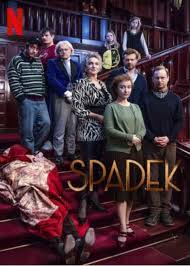
INHERITANCE/SPADEK
Wind, 2024, 93 minutes, Colour.
Jan Peszek, Maciel Stuhr, Joanna Trzepiezcibnska, Gabriella Muskawa, Piotr Pacek.
Directed by Sylwester Jakimow.
This is a popular comedy designed for Polish audiences. However, basic plot is universal (seen in such films as the British Laughter in Paradise, or the various versions of The Cat and the Canary), relatives gathering for the reading of a will.
As expected, there is a motley set of characters, are very fixated teacher, his haughty and somewhat ambitious wife, teenage daughter, younger son. There is a writer of crime fiction with a younger man, and a gay couple. Nieces and nephews of the eccentric inventor, game show host, with whom they have had little contact, but who has summoned them, by the eccentric butler. As a sitting, the but the reeds the will – all the money left to a local orphanage.
But, the uncle is alive, inviting them to get to know each other, and some games that he wants them to play. Although disappointed in not getting the money, there is the prospect of getting the patents to his many inventions if they succeed in the game.
So, a whole lot of popular ingredients which may appeal to the popular audience (it seems not to critics!). There is the range of characters and their eccentricities. There is a storm but to policeman turn up and interrogate each of the adults, the audience seeing what they answered in their interrogations and what they say they said. And these turn out to be bogus police, to criminals eager to find the patents.
There is a voice-over by the father of the two children, rather ingenuous in its way. And, of course, each of the characters has a secret, the state couple pondering a divorce, the gay couple the possibilities of adopting, the novelist concealing her age and wondering whether the younger man is really in love with her.
And course there are secret passages and tunnels in the house, and escape room and the various shenanigans to get out, the quiz a quiz for them to be eligible for the patents.
And the further complication that the old uncle has been stabbed to death, his having invented a stronger than Kessler first and shown how he could stabbed himself without dying – but stabbed while not wearing it!
In various solutions, the old uncle and ominously ringing each of the candidates to get information from them so that he could build up his quiz and test them, and the revelation about one of his programs, a woman giving a wrong answer then committing suicide, her son going to an orphanage and wanting to wreak revenge. Spoiler, the young lover of the novelist was the son of the quiz contestant!
Actually, the plot could be remade by any other film industry.
Am I OK?
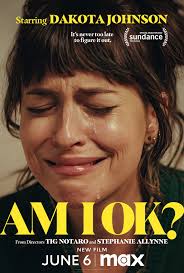
AM I OKAY?
US, 2022, 95 minutes, Colour.
Dakota Johnson, Sonoya Mizuno, Jermaine Fowler, Kiersey Clemens, Sean Hayes, Tim Notaro.
Directed by Stephanie Allynne, Tig Notaro.
This is a continued question by the central character, Lucy, played by Dakota Johnson. She is 32, working in mass Haj but schooled in painting, and questioning her sexual orientation and attractions.
This is a film for female audience, the male audience looking on from the outside, two male characters somewhat on the periphery of the action.
The writer and directors are wanting to explore Lesbian issues, the uncertainties of the central character reflecting on her past, of the formal relationship with a male friend, an attraction towards a co-worker in mass Haj, and quite a lot of discussion about female issues.
Is also a story of friendship, the of the central character, Jane, played by some lawyer mid to know, is a best friend from years ago, not appreciating the orientation of Lucy, always wanting to give her advice, a controlling character, eager to set her up with a man friend, quite explicit in sex language, in a relationship with Danny, Jermaine Fowler.
The cause of conflict is the situation in which Jane, originally from London, is asked by her boss (a cameo by Sean Hayes) to set up a bureau in London – and the effect on Lucy, sometimes emotionally distraught, thrown back on her own devices, and experiment with the worker at the mass arch, on to cope with the loss of her best friend.
The two friends attend yoga classes and Jane goes to a camp, with a cameo by Tim Notaro yoga and meditation oriented we Jane is urged to scream as loudly as possible – and she does.
There is a surprise ending with Lucy deciding to teach and to London, stay for a while – but neglects to think about where she will park the car while she is away! (And one wonders how she paid for the ticket to London books are quickly.)
While there are many mainstream films about manual gay friendships, this is a contribution to films about lesbian questions.
No Accident
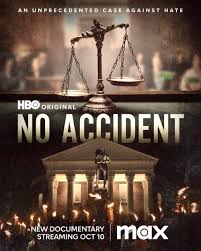
NO ACCIDENT
US, 2023, 97 minutes, Colour.
Directed by Kristi Jacobson.
This is a significant documentary for American audiences. It is also significant for non-American audiences who observe the ideological conflicts, the action of the white supremacists, protests against them, the rally in Charlottesville 2017, the violence, interest charging protesters and killing one. Famously, the day after the rally and the death, President Trump from made a speech stating that there were good people on each side, leading to criticisms in his first year of his presidency.
Two lawyers with strong reputations, Robbie Kaplan and Karen Dunn began a lawsuit against 17 L of the white supremacists, charging them with conspiracy to incite violence. And they contacted 12 plaintiffs, many injured during the rally.
This is a documentary by Kristi Jacobson who has quite a strong portfolio of documentary films and television episodes. And filming began with the proceedings inaugurated in 2017. Covered the work of the two lawyers, the recruiting associates, there is legal aspects in proceeding with the case. There are also interviews with the plaintiffs telling their stories as well is a great deal of footage from Charlottesville itself.
There are extensive interviews with the defendants, especially filmed during the D positions, their defence, discounting all charges – but some of them quite violent in their responses.
The case progressed somewhat slowly, and then was held up considerably by Covid and locked down, finally coming to the courts in October 2021.
While the film takes us behind the scenes of preparation for the case, with strong interviews from those concerned, there is a great deal of footage from the case itself, the questioning of the plaintiffs and the emotional effect on them, but, significantly, the interviews with the defendants. A lot of research was done for documentation about their careers, their intentions. However, so much of the evidence came from emails, texts, recorded phone calls, video material, some very strong and expressions of insight into violence.
There is some suspense as the jury goes out that all defendants were found guilty. The court also imposed considerable fines – though these were later reduced and the defendants have appealed.
It is important to have this kind of material within the space of a documentary, available for the wide audience, an opportunity to see the faces of the white supremacist movement and, especially, listening to them speak with their bigotry, their theories about Jews and other races replacing the whites, the misogyny, and the absolute self-confidence and self-righteousness. Especially Richard B.Spencer who concludes one speech with “Hail, Trump”.
Despicable Me 4
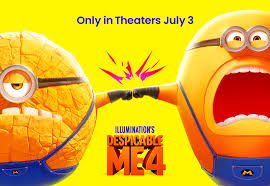
DESPICABLE ME 4
US, 2024, 95 minutes, Colour.
Voices of: Steve Carell, Kristin Wiig, Joey King, Will Ferrell, Sofia Vergara, Miranda Cosgrove, Pierre Coffin, Steve Coogan, Stephen Colbert.
Directed by Chris Renaud, Patrick Delage.
We might wonder how often we use the word “despicable” in real life. However, since 2010 and the first Despicable Me film, the first thing we think of when we hear the word (well, most of those who are younger) are the films and, especially, with all respect to Gru, the Minions. They appeared in Despicable Me 2 in 2013, had their very own film in 2015, reappeared in Despicable Me 3 in 2017. And, of course, these films can be regularly seen on streaming. The Minions are always with us. But, it is something of a surprise to find that it is seven years since the previous film.
It takes up where 3 left off, the Institute for villains, the escapades of some of the graduates, the agency led by Silas Ramsbottom (Steve Coogan) engaging the help of now reformed Gru (the popular Steve Carell).
This time we have a new villain, top graduate to Gru’s jealousy, a Frenchman, Maxime (voiced by Will Ferrell). He is vain, something of a peacock in clothes and strutting, has an odd criminal girlfriend who spends most of her time putting on lipstick, determined to be a worldwide criminal phenomenon.
It doesn’t quite work out that way, Ramsbottom summoning Gru into action. Since we know Gru from the past, we know that this isn’t going to be swift justice being done, a whole lot of situations going wrong, Maxime actually caught and imprisoned but, of course, escaping and continued to threaten.
We have seen it before but we are happy to see it all again! This time we see Gru’s wife and children again but there is a new bundle of joy, a baby son. He is a bundle of joy for his mother, always smiling and goo-gooing, but scowling at his father. Which means then that the baby offers an opportunity for Maxime to take him as a hostage, Gru in pursuit (even on high buildings, on an aircraft, all over the place).
And the Minions, plenty of them, their shapes, yellow colour, range of situations, sometimes awkward, often to the rescue, then mumbling and chirping, even, at one stage, their Academy, and dozens of them there on screen. And we are thinking and feeling, long live the Minions!
Lots of action, lots of colour, lots of comic situations (and the question of how long this kind of action franchise can continue), happy family reunion, and the baby now goo-gooing its daddy.
- The popularity of the Despicable Me series, Gru and his adventures, the presence of the Minions?
- The animation style, colour, movement, settings, real and imaginative? The characters in this style? The range of the Minions? The voice cast? The musical score?
- The continuation from the previous film, the Institute, villains, the management, the awards? The social, Gru dramatic arrival, with the Minions, his expectations, the clash with Maxime? Maxime winning the award? His speech and attitudes? Ambitions? The picture of his girlfriend, Valentina, lips on lipstick?
- Maxime and his career, the clash with Gru, the threats, the threats to the family, their going to the safe house, the continued threats? The visit of the old lady from the Institute?
- Gru, his wife, support, the family, the happy scenes, the teenage daughter, the little children, the scenes with the new baby, severe with his father, smiling at his mother? His finally being abducted, Gru to the rescue, Maxime and his controlling the baby, the baby finally acting, reconciled with father, family?
- Maxime and his actions, crimes, reputation, daredevil? Is arrest, imprisonment? His escape?
- The buildup to the confrontation between Maxime and Gru, the action sequences, in the air, the flight, the baby, over the city, precarious situations?
- Ramsbottom, his organisation, warning Gru, wanting his help, supervision?
- The comedy with the Minions, the characters, behaviour, voices and sounds, action? And the variety of Minions, being called from all occupations, gathering, the Minion force?
- An entertainment for children and adults?